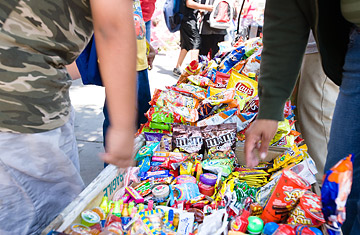
Bad food is easier to come by than good in too many places. Here junk fare is sold right outside a school.
(4 of 4)
The program has been a remarkable success: one part of it, increasing the availability of fresh fruits and vegetables in elementary schools, along with nutrition education, is credited with helping reduce the incidence of overweight students 50%, according to a study published in the journal Pediatrics. The Food Trust is expanding into New York, Louisiana and Illinois, and executive director Yael Lehman believes every American city could benefit. "When the only thing that is available is fast food, that's what kids will be eating," she says.
Grass-roots groups like the Food Trust are a fragile shield against the onslaught of bad food all Americans--but especially American kids--face. In 2000 the average child watched 40,000 commercials, double the number in 1970, and many of the ads were for just the kinds of nutritional junk that's causing so many of our problems. The $2 billion--plus marketing budget of a company like Coca-Cola dwarfs even the $500 million over five years being spent on childhood obesity by the Robert Wood Johnson Foundation.
Perhaps it's American to take caveat emptor as our creed, to let the junk food we so clearly love flow freely into the marketplace--and if you can't be bothered to hunt up some vegetables or take a jog now and then, your weight problems are your own. But if that philosophy seems harsh when we're dealing with adults--not to mention blind to the enormous health-care costs that will burden the nation--it's positively heartless toward children. An Oglala Sioux on the reservation, a first-generation Hispanic American in L.A., a poor white kid in the hills of West Virginia--no one asks to be born into an environment where obesity seems to be the default fate. "This is probably the most important public-health problem facing the country today," says Lavizzo-Mourey of the Robert Wood Johnson Foundation. "We are committed to doing what it takes, for as long as it takes." So should we all be, until childhood obesity no longer has a geography.
